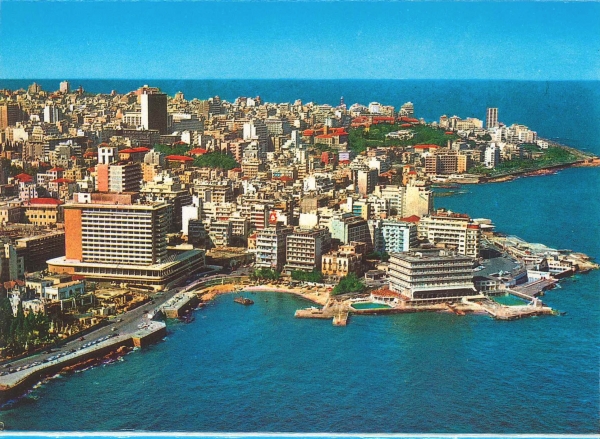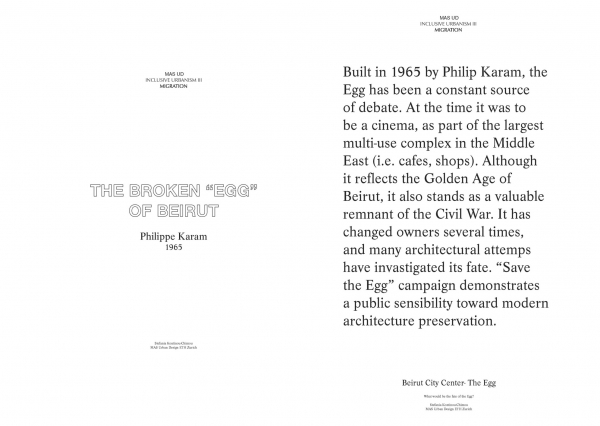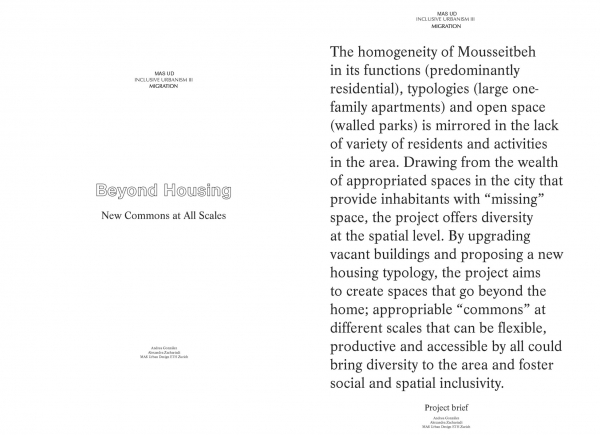Research + Teaching
Inclusive Beirut
ETHZ MAS Urban Design: Inclusive Urbanism and Migration 2017-2019
“So how does her taste become? A taste of fire and smoke/ Beirut has a glory of ashes”
Fairuz, Rahbani, Ziad and Joaquin Rodrigo. “Li Beirut.” Ma’rifti Feek, Relay-in, 1987.
Beirut is a vivid, complex, and messy city shaped by various forces, cultures, and practices, scarred by recent and ongoing conflicts—its architecture mirroring this rich background. Starting with an investigation of some of the city’s iconic buildings and architecture, their history, context, and functions, the studio investigates how architecture bears political, cultural, social and economic meanings, inscribed in the wider realms of urban and national territories. The design task ‘Inclusive Beirut’ was fitting to answer a competition brief by Public Works, the Order of Engineers and Architects in Beirut and UNHabitat, the “Think Housing” competition. To contribute to the competition fulfilled the studio’s goals. Aiming to contribute to the local debate on the possibilities of inclusive cities and affordability, by proposing innovative proposals and alternative ideas that challenge the dominant model of urban development and address the displacement of low and middle-income residents from the city. Particular attention was given to migrant communities (from the region, the periphery or the neighboring countries). Through five localized cases in five neighborhoods of Beirut, the studio tackled the lack of alternative housing programs and planning practices that prioritize high-profit generation, at the expense of all other parameters of urban inclusivity and sustainability, by proposing urban design strategies.
The "Inclusive Urbanism and Migration" studio tackled urgent questions of migration in relation to architecture and urban space, investigating how cities cope with newcomers and how migration shapes space. This work proposes ideas and design solutions for heterogeneous programs working with construction materials and methods, tenure mechanisms, land occupation, and natural resources, among other factors. The studio takes as a point of departure that thriving on social justice, wealth redistribution, democracy, and ecological awareness, urban design can be an innovative, resilient, and politically powerful tool for actors involved in the production of the built environment to contribute to a more inclusive practice of urbanism.
Several projects have been awarded in the frame of the “Think Housing” competition organized by Public Works, the Order of Engineers and Architects in Beirut and UNHabitat:
2nd Prize - Social Infrastructure for all (Mousseitbeh), Kalliopi Sakellaropoulou; Simran Bansal
Honorable Mentions:
Ras Beirut Collective (Ras Beirut) Drhuv Gusain; Chrysoula Pierrakou
Home in Progress (Tariq El Jdide) Stefania Kontinou-Chimou; Ornpailin Leelasiriwong
Students: Afentouli Eirini, Alnashmi Jassim, Bansal Simran, Gkotsopoulou Georgia, Gonzalez Palos Andrea, Gusain Dhruv, Joshi Akash, Kontinou Chimou Stefania, Leelasiriwong Fai, Meloni Beatrice, Patel Caitanya, Skate-Patel Rima, Pierrakou Chrysoula, Sakellaropoulou Kalliopi, Vargas Mondragon Mariana, Zachariadi Alexandra, Zhang Yihan (2018-2019).
2018-2019, Director, in collaboration with Something Fantastic and Public Works.
Teaching Assistants: Lukas Graf, Sara Sherif, Nancy Naser El Din
Understanding the territory and its complexity via thematic entry points such as street iconography, resources, vegetation, etc.



